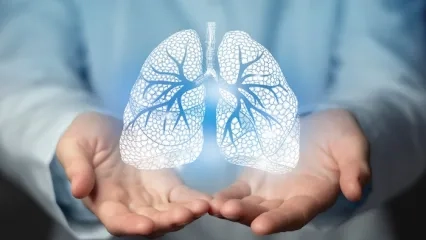Alo Yeditepe
Alo Yeditepe
Causes, Symptoms, and Treatment of Asthma
Asthma is a chronic disease characterized by shortness of breath or coughing attacks. The basis of the disease is the hypersensitivity of the airways. As a result of this hypersensitivity, our bronchi narrow, and edema and sputum production increases in the bronchial wall. After stimuli such as dust, smoke, and smell, complaints such as shortness of breath and a feeling of pressure in the chest begin.
Chest Diseases Specialist Asst. Prof. Dr. Seha Akduman pointed out that asthma, a chronic disease, is quite common in the world and Turkey.
What is asthma?
Asthma is a chronic disease characterized by shortness of breath or coughing attacks. The basis of the disease is the hypersensitivity of the airways. As a result of this hypersensitivity, our bronchi narrow, and edema and sputum production increases in the bronchial wall. Stimuli such as dust, smoke, smell, complaints such as cough, shortness of breath, and a feeling of pressure in the chest occur immediately.
It is quite common all over the world and in our country. Its frequency is increasing, and it is a serious public health problem. In our country, asthma is observed in approximately 5-7 of every 100 adults and 13-15 of every 100 children.
What are the symptoms of asthma?
The most important symptoms are shortness of breath, cough, feeling of pressure in the chest, and shortness of breath after exposure to odor, dust, smoke, and allergen. These complaints come in seizures. They usually appear at night or in the morning and vary seasonally. It improves on its own or with medications. A prolonged cough after a cold is also one of the important symptoms of asthma.
What are the most common causes of asthma attacks?
Allergens are substances that are harmless to our body but can cause a reaction of the immune system in susceptible people. 80% of asthma in children and 50% in adults is caused by allergies. The most common allergens are pollen, house dust mites, mold spores, cockroaches, animal hair, and foods such as eggs, peanuts, fish, wheat, and soy.
Air Pollution and Smoking; Asthmatic patients are more affected by harmful gases and heavy metals and may have attacks.
Stress and emotional changes can also cause asthma symptoms to appear. Crying or laughing, which causes frequent and deep breathing, can stimulate the airways. Restlessness and irritability can also trigger asthma symptoms.
Exercise, that is, physical activity, can cause attacks in uncontrolled asthmatics. Or asthma complaints may begin with exercise alone. Although the definition of asthma triggered by exercise is rare, it should definitely be questioned in the story.
Cold air can trigger asthma by causing reactions such as allergic reactions in the bronchi. There is only a group of asthmatic patients triggered by cold weather, and it should be questioned again in the story.
How is asthma definitively diagnosed?
The diagnosis of asthma is made by appropriate history, physical examination, and pulmonary function test. Allergy tests may be done to support the diagnosis. Chest radiography, tomography, and blood tests are performed to exclude diseases that may cause similar complaints such as COPD, pneumonia, and lung cancer.
How many types of asthma are there? What are the differences?
Although there are many subgroups such as Allergic Asthma, Cold-triggered asthma, exercise-triggered asthma, cough variant asthma, and Occupational asthma, today we use the general definition of Bronchial Asthma. These classifications are usually made according to the triggers.
Typical wheezing and shortness of breath are not expected in asthma with cough, and this occurs in the patient group with dry stubbornness and cough in attacks.
How is asthma treated?
Treatment of asthma is determined by the frequency of the patient's attack and the pulmonary function test. Drug doses and frequencies vary at each step. It is very important to clearly identify the factors that cause attacks, to avoid these factors, and to use drugs regularly.
The patient's education constitutes the most important step of the treatment. When the attack occurs, the patient or their relatives should learn the dose and duration of the rescue drugs until the time they consult the doctor.
Is it true that there is no definitive cure for asthma? Is there an important development that we would like to convey regarding the recent research on this disease?
Asthma is a chronic disease and there is no definitive cure. Patients should use their medications regularly and it is recommended that drug doses be reviewed in their examinations within 3-month periods. The goal is to achieve full control with minimal medication and full control.
What advice would you give to those who have to live with asthma?
The quality of the air inhaled in Asthma, a chronic lung disease, is very important. They should stay away from harmful gases, detergents, dust, air pollution, and cigarette smoke. They should use their medication regularly and should not discontinue their medication unless the doctor recommends it. Since respiratory infections can be severe, it is recommended that asthmatic patients should definitely get pneumonia, flu, and COVID vaccines.
Is it true that some professions play a triggering role in asthma? Can you tell me about it?
Occupational asthma can be defined as the occurrence of cough and shortness of breath complaints in the workplace of patients who do not have any complaints outside the workplace. Asthma may start due to the allergens and particles s/he is exposed to, especially in the workplace where he/she works. This group of patients requires joint follow-up with the workplace physician and Occupational Diseases specialists.
How is an asthma attack seen? What is recommended to do in such a situation?
An asthma attack is defined as the onset of coughing, sputum, wheezing, or an increase in complaints in symptom-free patients. In this patient group, breath-opening drugs, which we define as rescue drugs, are started in a short time. Depending on the degree of asthma attack, outpatient follow-up or intensive care support may be required in severe cases. It is known that the risk of death increases in difficult-to-control and severe attacks, and close follow-up of patients is recommended.
Does neglected asthma cause death? Some experts suggest that asthma can cause COPD due to delayed treatment, is this true? What is COPD?
Patients who are neglected and not under full control for many years develop permanent damage over the years and their lung capacity decreases irreversibly. Although the narrowing of the airways in asthma is considered reversible, irreversible restrictions in the airways may develop in patients who have frequent attacks and remain uncontrolled, as in COPD. This problem, which is very common, especially in advanced stages, can be prevented with regular and appropriate drug use.
Press Coverage: indyturk
About
Faculty and Year of Graduation:
Gazi University Faculty of Medicine, 2007
”
See Also
- How to Cleanse Your Lungs?
- Is Breathing Air Dangerous in Fires?
- What is Electronic Cigarette Disease (EVALI)? EVALI Symptoms and Treatment
- What is COPD? Symptoms and Treatment of COPD
- Long Journeys Increase the Risk of Embolism!
- What Asthma and COPD Patients Should Pay Attention to When Using Air Conditioning!
- What is Allergy? What are the Symptoms of Allergy?
- What is Desert Dust? Harms of Desert Dust
- Lung Cancer Screening Age
- What is Good for Cough? How to Cure Cough?
- Lung Cancer Symptoms and Treatment
- 10 Ways to Have a Sound Sleep in the Heat
- What Should Asthma Patients Be Cautious About?
- Does Poor Quality Sleep Increase The Risk of Asthma?
- What Causes Insomnia, Diagnosis and Treatment
- 9 Common Misconceptions About COPD
- Allergy and Asthma During Pregnancy
- It Is Aimed to Eliminate Tuberculosis Worldwide By 2030
- Lung Patients Should Not Stop Their Medications
- 4 Significant Preliminary Symptoms of Lung Cancer
- How Does Acid Rain Affect Human Health?
- The Slowing Traffic in Istanbul Increases the Risk of Cancer!
- The American Cancer Society Has Announced; The Age of Screening For Lung Cancer Has Decreased
- Hidden Lung Cancer Cases Revealed in Tomographs Taken Due to Coronavirus
- Obesity is Both a Cause and Consequence of Sleep Apnea
- Asthma and COPD Attack Season Begins
- Lung Cancer
- Snoring and Its Treatment
- Using Antipyretics Uncontrolled Can Hide Pneumonia Symptoms
Alo Yeditepe




